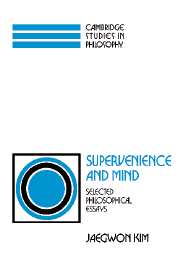Book contents
- Frontmatter
- Contents
- Preface
- Sources
- Part I Events and supervenience
- 1 Causation, nomic subsumption, and the concept of event
- 2 Noncausal connections
- 3 Events as property exemplifications
- 4 Concepts of supervenience
- 5 “Strong” and “global” supervenience revisited
- 6 Epiphenomenal and supervenient causation
- 7 Supervenience for multiple domains
- 8 Supervenience as a philosophical concept
- 9 Postscripts on supervenience
- Part II Mind and mental causation
- Index
2 - Noncausal connections
Published online by Cambridge University Press: 28 January 2010
- Frontmatter
- Contents
- Preface
- Sources
- Part I Events and supervenience
- 1 Causation, nomic subsumption, and the concept of event
- 2 Noncausal connections
- 3 Events as property exemplifications
- 4 Concepts of supervenience
- 5 “Strong” and “global” supervenience revisited
- 6 Epiphenomenal and supervenient causation
- 7 Supervenience for multiple domains
- 8 Supervenience as a philosophical concept
- 9 Postscripts on supervenience
- Part II Mind and mental causation
- Index
Summary
“If the match had not been struck, it would not have ignited.” This counterfactual expresses a relationship of dependency between two events: the ignition of the match was dependent on the match's being struck. Here, the dependency is a causal one: the striking of the match caused it to light. We also say: the ignition was causally determined by the striking. The causal relation is a paradigmatic case of what I shall call relations of “dependency” or “determination” between events and states; in fact, it is the only relation of this sort that has been explicitly recognized and widely talked about.
The dominant place accorded to the causal relation is evident in the fact, for example, that the thesis of universal determinism is most often stated in some such form as “Every event has a cause.” The implicit assumption in such a formulation is that being determined comes to the same thing as being caused. This, however, requires reconsideration. There appear to be dependency relations between events that are not causal, and, as I shall argue, universal determinism may be true even if not every event has a cause. These noncausal dependency relations are pervasively present in the web of events, and it is important to understand their nature, their interrelations, and their relation to the causal relation if we are to have a clear and complete picture of the ways in which events hang together in this world.
Information
- Type
- Chapter
- Information
- Supervenience and MindSelected Philosophical Essays, pp. 22 - 32Publisher: Cambridge University PressPrint publication year: 1993
Accessibility standard: Unknown
- 1
- Cited by
